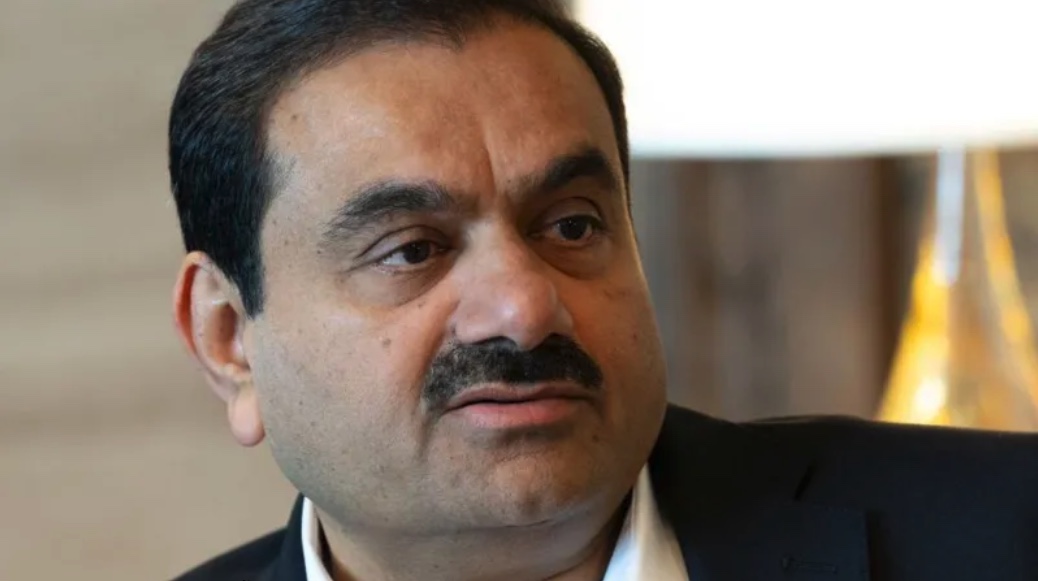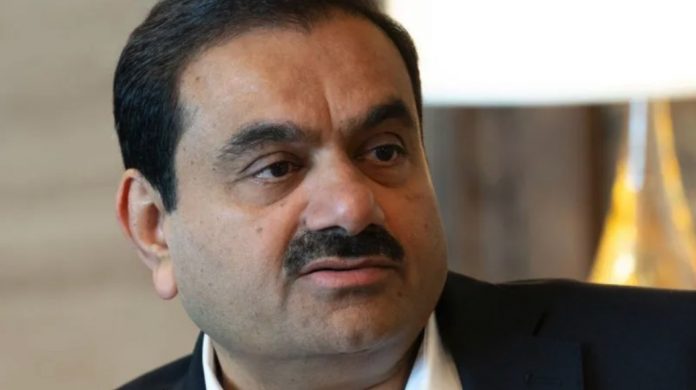เมื่อไม่กี่สัปดาห์ก่อนหน้านี้ โกตัม อดานี มหาเศรษฐีชาวอินเดียและหนึ่งในบุคคลที่ร่ำรวยที่สุดในโลก เพิ่งฉลองชัยชนะการเลือกตั้งของโดนัลด์ ทรัมป์ พร้อมประกาศแผนการลงทุนมูลค่า 10 พันล้านดอลลาร์สหรัฐ (ประมาณ 7.9 พันล้านปอนด์) ในโครงการพลังงานและโครงสร้างพื้นฐานในสหรัฐฯ
แต่ในขณะนี้ มหาเศรษฐีวัย 62 ปี ผู้เป็นพันธมิตรใกล้ชิดกับนายกรัฐมนตรีนเรนทรา โมดี และเจ้าของอาณาจักรมูลค่า 169 พันล้านดอลลาร์สหรัฐ เจ้าของธุรกิจท่าเรือ พลังงานหมุนเวียน และอีกมากมาย กำลังเผชิญข้อกล่าวหาฉ้อโกงในสหรัฐฯ ซึ่งอาจเป็นอุปสรรคต่อความทะเยอทะยานทั้งในประเทศและต่างประเทศ
อัยการกลางสหรัฐฯ กล่าวหาเขาว่าจัดตั้งแผนการติดสินบนมูลค่า 250 ล้านดอลลาร์สหรัฐ พร้อมปกปิดข้อมูลเพื่อระดมทุนในสหรัฐฯ โดยอ้างว่าอดานีและทีมผู้บริหารได้จ่ายสินบนให้เจ้าหน้าที่อินเดียเพื่อให้ได้มาซึ่งสัญญาที่สร้างผลกำไรมากกว่า 2 พันล้านดอลลาร์สหรัฐในระยะเวลา 20 ปี ด้านกลุ่มอดานีปฏิเสธข้อกล่าวหา โดยระบุว่าเป็น “เรื่องที่ไร้เหตุผล”
แต่ผลกระทบก็เริ่มปรากฏชัดเจนต่อกลุ่มธุรกิจและเศรษฐกิจของอินเดีย โดยมูลค่าตลาดของบริษัทในกลุ่มอดานีลดลงถึง 34 พันล้านดอลลาร์สหรัฐในวันพฤหัสบดีที่ผ่านมา ส่งผลให้มูลค่ารวมของบริษัทในเครือทั้ง 10 แห่งเหลือเพียง 147 พันล้านดอลลาร์สหรัฐ นอกจากนี้ อดานี กรีน เอนเนอร์จี ซึ่งเป็นบริษัทที่เกี่ยวข้องกับข้อกล่าวหา ยังประกาศยกเลิกแผนการออกพันธบัตรมูลค่า 600 ล้านดอลลาร์สหรัฐ
ผลกระทบต่อเศรษฐกิจและการเมืองอินเดีย
เศรษฐกิจอินเดียพึ่งพาธุรกิจของอดานีอย่างเสียไม่ได้ เขาเป็นผู้นำในธุรกิจโครงสร้างพื้นฐานของประเทศ โดยดำเนินกิจการท่าเรือ 13 แห่ง (ส่วนแบ่งตลาด 30%) สนามบิน 7 แห่ง (23% ของผู้โดยสาร) และธุรกิจซีเมนต์ที่ใหญ่เป็นอันดับสองของอินเดีย (20% ของตลาด)
นอกจากนี้ เขายังเป็นผู้ผลิตไฟฟ้าถ่านหินรายใหญ่ที่สุดของอินเดีย และมีโครงการพลังงานหมุนเวียน รวมถึงแผนการลงทุน 50 พันล้านดอลลาร์สหรัฐในไฮโดรเจนสีเขียว อีกทั้งยังดำเนินการสร้างทางด่วนที่ยาวที่สุดของอินเดีย และพัฒนาชุมชนแออัดที่ใหญ่ที่สุดในประเทศ
ในระดับโลก อดานีมีโครงการเหมืองถ่านหินในอินโดนีเซียและออสเตรเลีย รวมถึงโครงการพลังงานและสนามบินในเคนยาและโมร็อกโก โดยยังมองหาโอกาสในโครงการโครงสร้างพื้นฐานมูลค่ากว่าพันล้านดอลลาร์สหรัฐในแทนซาเนียและเคนยา
อาณาจักรธุรกิจของอดานีมีความสอดคล้องกับนโยบายของโมดี โดยเริ่มจากการพัฒนาโครงสร้างพื้นฐาน และล่าสุดขยายไปสู่พลังงานสะอาด แม้จะถูกวิจารณ์ว่าเป็นตัวอย่างของ “ระบบทุนนิยมพวกพ้อง” แต่เขาปฏิเสธข้อกล่าวหาเรื่องการพึ่งพาความสัมพันธ์ทางการเมือง
ผู้สังเกตการณ์หลายคนมองว่าข้อกล่าวหานี้อาจกระทบต่อเศรษฐกิจและการเมืองของอินเดีย โดยอดานีเพิ่งเริ่มฟื้นฟูภาพลักษณ์จากรายงานของ Hindenburg Research ในปี 2023 ซึ่งกล่าวหาว่าเขาฉ้อโกงและบิดเบือนราคาหุ้น แม้เขาจะปฏิเสธข้อกล่าวหา
ในขณะเดียวกัน อดานีอาจเผชิญความยากลำบากในการระดมทุนสำหรับโครงการที่ต้องใช้เงินทุนมหาศาลในอนาคต รวมถึงโครงการขยายตัวในระดับโลกที่อาจชะลอออกไป
นักวิเคราะห์มองว่า ผลกระทบต่อความสัมพันธ์ทางธุรกิจระหว่างสหรัฐฯ และอินเดียอาจไม่รุนแรงนัก เนื่องจากการค้าและการลงทุนระหว่างสองประเทศยังคงดำเนินต่อไป อย่างไรก็ตาม ข้อกล่าวหาเหล่านี้อาจส่งผลกระทบต่อความเชื่อมั่นของนักลงทุนต่างชาติ และอาจเปิดโอกาสให้นักการเมืองฝ่ายค้านในอินเดียโจมตีรัฐบาล
ในขณะที่สถานการณ์ยังคงดำเนินต่อไป กลุ่มอดานีคาดว่าจะต้องเตรียมการป้องกันทางกฎหมายอย่างเต็มที่ พร้อมรับมือกับผลกระทบทั้งในระดับประเทศและนานาชาติ
How Adani’s US fraud charges impact India’s economy and politics

Just weeks ago, Gautam Adani, one of the world’s richest men, celebrated Donald Trump’s election victory and announced plans to invest $10bn (£7.9bn) in energy and infrastructure projects in the US.
Now, the 62-year-old Indian billionaire and a close ally of Prime Minister Narendra Modi, whose sprawling $169bn empire spans ports and renewable energy, faces US fraud charges that could potentially jeopardise his ambitions at home and abroad.
Federal prosecutors have accused him of orchestrating a $250m bribery scheme and concealing it to raise money in the US. They allege Mr Adani and his executives paid bribes to Indian officials to secure contracts worth $2bn in profits over 20 years. Adani Group has denied the allegations, calling them “baseless.”
But this is already hurting the group and the Indian economy.
Adani Group firms lost $34bn in market value on Thursday, reducing the combined market capitalisation of its 10 companies to $147bn. Adani Green Energy, which is the firm at the centre of the allegations, also said it wouldn’t proceed with a $600m bond offering.
Then there are questions about the impact of the charges on India’s business and politics.
India’s economy is deeply intertwined with Mr Adani, the country’s leading infrastructure tycoon. He operates 13 ports (30% market share), seven airports (23% of passenger traffic), and India’s second-largest cement business (20% of the market).
With six coal-fired power plants, Mr Adani is India’s largest private player in power. At the same time, he has pledged to invest $50bn in green hydrogen and runs a 8,000km (4,970 miles)-long natural gas pipeline. He’s also building India’s longest expressway and redeveloping India’s largest slum. He employs over 45,000 people, but his businesses impact millions nationwide.
Mr Adani’s global ambitions span coal mines in Indonesia and Australia, airport and energy projects in Kenya and Morocco. The group is eyeing more than a billion dollars in infrastructure projects across Tanzania and Kenya.
Mr Adani’s portfolio closely mirrors Modi’s policy priorities, beginning with infrastructure and more recently expanding into clean energy. He has thrived despite critics labeling his business empire as crony capitalism, pointing to his close ties with Modi, both as Gujarat’s chief minister – where they both hail from – and as India’s prime minister. (Like any successful businessman, Mr Adani has also forged ties with many opposition leaders, investing in their states.)
“This [the bribery allegations] is big. Mr Adani and Modi have been inseparable for a long time. This is going to influence the political economy of India,” says Paranjoy Guha Thakurta, an Indian journalist who has written extensively on the business group.
This crisis also comes as Mr Adani has spent nearly two years trying to rebuild his image after US short-seller Hindenburg Research’s 2023 report accused his conglomerate of decades of stock manipulation and fraud. Though Mr Adani denied the claims, the allegations triggered a market sell-off and an ongoing investigation by India’s market regulator, SEBI.
“Mr Adani has been trying to rehabilitate his image, and try to show that those earlier fraud allegations leveled by the Hindenburg group were not true, and his company and his businesses had actually been doing quite well. There’d been a number of new deals and investments made over the last year or so, and so this is just a body blow coming to this billionaire who had done a very good job of shaking off the potential damage of those earlier allegations,” Michael Kugelman of the Wilson Center, an American think-tank, told the BBC.
For now, raising capital at home may prove challenging for Mr Adani’s cash-guzzling projects.
“The market reaction shows how serious this is,” Ambareesh Baliga, an independent market analyst, told the BBC. “Adanis will still secure funding for their major projects, but with delays.”
The latest charges could also throw a spanner in Mr Adani’s global expansion plans. He has been already challenged in Kenya and Bangladesh over a planned takeover of an international airport and a controversial energy deal. “This [bribery charges] stops international expansion plans linked to the US,” Nirmalya Kumar, Lee Kong Chian Professor at Singapore Management University, told the BBC.
What’s next? Politically, opposition leader Rahul Gandhi has unsurprisingly called for Mr Adani’s arrest and promised to stir up parliament. “Bribing government officials in India is not news, but the amounts mentioned are staggering. I suspect the US has names of some of those who were the intended recipients. This has potential reverberations for the Indian political scene. There is more to come,” Mr Kumar believes.
Mr Adani’s team will undoubtedly assemble a top-tier legal defence. “For now, we have only the indictment, leaving much still to unfold,” says Mr Kugelman.
While the US-India business relationship may face scrutiny, it’s unlikely to be significantly impacted, particularly given the recent $500m US deal with Mr Adani for a port project in Sri Lanka, says Mr Kugelman. Despite the serious allegations, broader US-India business ties remain strong.
“The US-India business relationship is a very large and multifaceted one. Even with these very serious allegations against someone that’s such a major player in the Indian economy, I don’t think we should overstate the impact that this could have on that relationship,” Mr Kugelman says.
Also, it’s unclear if Mr Adani can be targeted, despite the US-India extradition treaty, as it depends on whether the new administration allows the cases to proceed. Mr Baliga believes it is not doom and gloom for the Adanis. “I still do think foreign investors and banks will back them like they did post Hindenburg though, given that they are part of very important, well performing sectors of the Indian economy,” he says.
“The sense in the market is also that this will perhaps blow over and be sorted out, once the [Donald] Trump administration takes over.”
By Soutik Biswas, BBC News

















